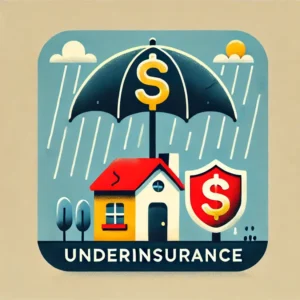Many wealthy people unknowingly fall prey to underinsurance, leaving critical gaps in their coverage that can lead to significant financial risks.
For high-net-worth individuals and global professionals, insurance isn’t just about covering assets—it’s about safeguarding your entire lifestyle.
Are you underinsured?
If you are looking to invest as an expat or high-net-worth individual, which is what I specialize in, you can email me (hello@adamfayed.com) or WhatsApp (+44-7393-450-837).
This includes if you are looking for a second opinion or alternative investments.
Some facts might change from the time of writing. Nothing written here is financial, legal, tax, or any kind of individual advice or a solicitation to invest.
In this article, we’ll explore the definition of underinsurance and the five common underinsurance gaps that even the most well-prepared individuals often miss and provide insight on how to protect what truly matters.

What Is Underinsurance?
At its simplest, underinsurance means having insurance coverage that is insufficient to fully cover the value of the insured asset or risk.
This could be due to outdated valuations, underestimated liabilities, or incomplete coverage.
The risk may seem minor on paper until a claim is filed and the shortfall becomes glaringly clear.
Partial Coverage vs. Policy Gaps in Underinsurance
Underinsurance can manifest in two main ways: a partial coverage and a policy gap.
- Partial Coverage happens when the sum insured is simply too low. For instance, if your property is valued at $20 million but insured for only $12 million, you’re underinsured by 40%. In a total loss, you won’t be made whole.
- Policy Gaps, on the other hand, refer to areas where you have no coverage at all, often because the risk wasn’t anticipated or disclosed. Examples include cyber liability, global health emergencies, or lawsuits arising from international property holdings.
What Is an Example of Underinsurance?
Underinsurance becomes most apparent when a claim is filed, only to discover that the payout falls significantly short of the actual loss.
Here’s a practical example that illustrates how this can happen, especially for high-net-worth individuals:

Real-World Example: Underinsured Property Loss
Imagine a luxury vacation villa originally insured six years ago for $4 million, based on market value at that time.
Since then, the property’s value has increased to $6.5 million due to renovations, rising real estate prices, and the inclusion of high-end furnishings.
However, the insurance policy was never updated to reflect this appreciation.
Now, suppose a fire causes $1 million in damages.
Because the property was only insured for $4 million instead of its updated $6.5 million value, the insurance company applies what’s known as the “average clause”.
This clause reduces the payout proportionally based on the level of underinsurance.
Here’s how the math might work with the underinsurance formula:
Claim Payout = (Insured Amount ÷ Actual Value) × Loss Incurred
- Insured amount: $4,000,000
- Actual value: $6,500,000
- Coverage ratio: 62% (4M ÷ 6.5M)
- Claim filed: $1,000,000
- Payout after underinsurance adjustment: $615,385
That’s a $384,615 shortfall, all because the policy wasn’t updated to reflect current asset values.
This kind of loss can be even more severe for HNW individuals with rare or irreplaceable assets, where replacement costs far exceed standard coverage limits.

What Are The Causes of Underinsurance?
Underinsurance doesn’t happen overnight.
For many high-net-worth individuals, it builds up quietly over time through assumptions, oversight, or outdated risk assessments. Below are some of the most common causes:
Inaccurate or Outdated Valuations
Luxury properties, art collections, classic cars, or jewelry often increase in value, but insurance policies don’t update themselves.
If you haven’t re-evaluated your assets in the last 12 to 24 months, your current coverage may fall well below replacement or market value.
Lifestyle Upgrades Without Policy Adjustments
From acquiring a new vacation home to hiring private staff or purchasing a yacht, lifestyle upgrades should trigger a review of your insurance.
Without adjusting your policy accordingly, you’re likely underinsured—often significantly.
Complex, Cross-Border Asset Structures
For global citizens and expats, owning assets across multiple jurisdictions adds another layer of risk.
A domestic policy might not fully (or legally) cover international holdings, especially in high-risk or geopolitically sensitive areas.
Assuming One Policy Covers Everything
Comprehensive policies often sound reassuring, but many contain exclusions or limits that don’t match the reality of a high-net-worth lifestyle.
Whether it’s cyber risk, employee liability, or natural disasters, relying on a “one-size-fits-all” policy can lead to significant gaps.
Inflation and Construction Costs
Rising inflation and escalating construction costs can quickly outpace the values reflected in older insurance policies.
For high-value real estate, this often means a multi-million-dollar shortfall in the event of a rebuild.
Lack of Specialized Advice
Many mainstream insurance agents may not be equipped to assess the unique risk profiles of affluent clients.
Without a trusted advisor who understands wealth preservation, policies are often structured too broadly or too narrowly—both of which can result in underinsurance.
Why Underinsurance Is a Hidden Risk
Underinsurance often goes unnoticed until it’s too late, and tracking replacement costs over time can be difficult, making it a hidden financial risk.
Underinsurance isn’t just about having less coverage than you need. It’s about failing to match your insurance with your lifestyle, exposure, and evolving wealth profile.
For HNWIs, this disconnect can quietly build into a serious financial vulnerability, only surfacing in moments of crisis.

How Do You Deal with Underinsurance?

Dealing with underinsurance requires more than just increasing your policy limits.
For high-net-worth individuals, the process should be deliberate, data-driven, and customized to your unique circumstances.
Here’s a step-by-step approach:
1. Conduct a Comprehensive Insurance Audit
Start by reviewing all your existing insurance policies—property, liability, health, travel, and asset-specific coverage.
Look at both coverage limits and exclusions. Identify where the insured values may fall short of current market or replacement values.
2. Reassess Asset Valuations Regularly
Luxury real estate, art, collectibles, and even private vehicles should be professionally appraised every 1–2 years.
Inflation, market shifts, and upgrades can significantly change the value of your holdings, and your policy should reflect those changes.
3. Identify and Close High-Risk Gaps
Check for blind spots:
- Are all your international assets covered?
- Do you have enough personal liability coverage for legal threats?
- Is your travel and health insurance sufficient for multiple countries?
Once identified, these gaps can be closed with supplementary policies or riders.
4. Align Coverage with Lifestyle
Your coverage should evolve as your life does. Purchased a new property abroad? Added staff to your household? Expanded your investment portfolio?
These are moments that call for immediate policy updates to avoid gaps in protection.
5. Work with the Right Advisors
Partner with a wealth-focused insurance advisor who understands the nuances of your asset class and lifestyle.
They can help customize a layered insurance plan that’s not only comprehensive but also cost-effective, balancing coverage with efficiency.
6. Schedule Ongoing Reviews
Wealth isn’t static; your insurance shouldn’t be either.
Make it a point to review your entire insurance portfolio annually, or whenever there’s a significant life or financial change.
Prevention is far cheaper than the cost of underinsured loss.
Pained by financial indecision?

Adam is an internationally recognised author on financial matters with over 830million answer views on Quora, a widely sold book on Amazon, and a contributor on Forbes.



